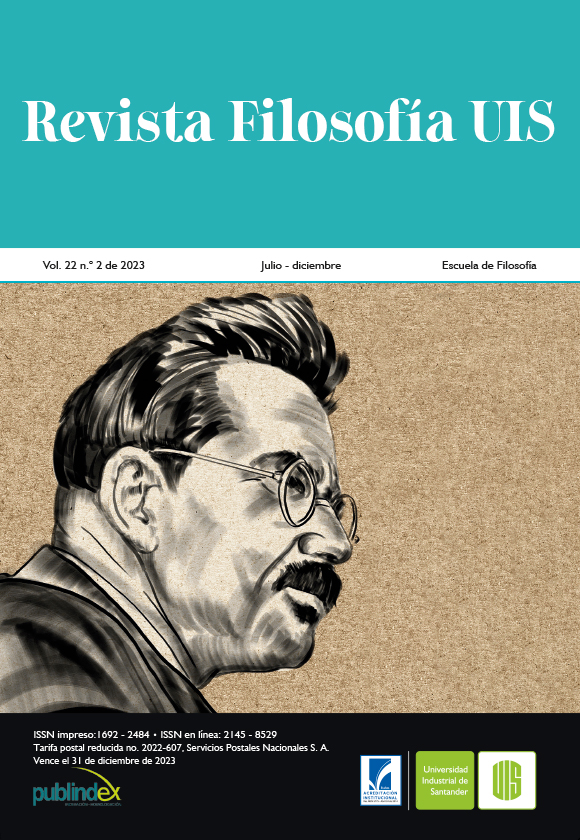Opinion and idea by Plato: the importance of teaching philosophy and philosophizing
Published 2023-06-28
Keywords
- education,
- philosophy teaching,
- idea,
- opinion,
- Plato
How to Cite
Copyright (c) 2023 Revista Filosofía UIS

This work is licensed under a Creative Commons Attribution 4.0 International License.
Abstract
This article aims to critically analyze the concepts of "opinion" (δόξα) and "idea" (ἰδέα) in the light of Plato's Republic and their influence on basic and secondary vocational education. It is part of a joint work between the teaching of Philosophy and philosophizing. A first section refers to the concept of opinion as an initial path that encourages the student to a critical-reflexive study of the problems of the State (Polis). The second emphasizes the concept of idea as a way to analyze and understand the difficulties that occur in the State (Polis). The last section exposes the importance of the teaching of Philosophy and of philosophizing in the educational task. To do this, the interpretation of some of Plato's dialogues and relevant research texts in the field of teaching Philosophy and pedagogy are used.
Downloads
References
- Aguirre, J. & Tillman, R. (2020). Análisis de los roles de la historia de la filosofía en la formación filosófica: hacia una propuesta didáctica para formar filósofos fontaneros. Revista Saber, Ciencia y Libertad, 15(2), 164-180. https://doi.org/10.18041/2382-3240/saber.2020v15n2.6727
- Balaguer García, E. (2020). Doxa y Paradoxa: el concepto de opinión pública en Ortega y el papel del filósofo. Doxa Comunicación, (30), 19-36. https://revistascientificas.uspceu.com/doxacomunicacion/article/view/410
- Baltzly, D. (1997). Knowledge and Belief in Republic V. Archiv für Geschichte der Philosophie, 79(3), 239-272. https://doi.org/10.1515/agph.1997.79.3.239
- Barnes, J. y Burnyeat, M. (1980). Socrates and the Jury: Paradoxes in Plato’s Distinction between Knowledge and True Belief. Aristotelian Society Supplementary Volume, 54(1), 173-206. https://doi.org/10.1093/aristoteliansupp/54.1.173
- Berrio-Peña, A. (2022). Estado del arte: formación democrática en Colombia desde la enseñanza de la Filosofía. Revista Filosofía UIS, 21(2), 229-252. https://doi.org/10.18273/revfil.v21n2-2022010
- Botero, A. (2021). Editorial. La formación de filósofos: entre el culturalismo y el anacronismo. Revista Filosofía UIS, 20(2), 11-18. https://doi.org/10.18273/revfil.v20n2-2021001
- Cajicá, C. F. (2017). Opinión e idea: Conceptos para la enseñanza de la filosofía a la luz de la República de Platón [tesis de pregrado, Universidad Industrial de Santander]. Repositorio de la Universidad Industrial de Santander.
- Carrasco, N. N. (2006). Del Cármides al Teeteto: Perspectivas de la dóxa en Platón [tesis de doctorado, Universitat de Barcelona]. http://diposit.ub.edu/dspace/handle/2445/35650
- Centurión, D. (2008). De la opinión a la sociedad de la información y del conocimiento: un abordaje epistemológico. Revista Internacional de Investigación en Ciencias Sociales, 4(2), 9-18.
- Fine, K. (1994). Essence and Modality: The Second Philosophical Perspectives Lecture. Philosophical Perspectives, 8, 1-16. https://doi.org/10.2307/2214160
- Foley, R. (2012). When is True Belief Knowledge? Princeton University Press.
- Gómez, A. (1974). Platón: los seis grandes temas de su filosofía. Fondo de Cultura Económica.
- Gosling, J. C. B. (1960). “Republic”: Book V: τὰ πολλὰ καλά etc. Phronesis, 5(2), 116-128. https://doi.org/10.1163/156852860X00045
- Grimm, S. (2006). Is Understanding a Species of Knowledge. British Journal for the Philosophy of Science, 57(3), 515-535. https://doi.org/10.1093/bjps/axl015
- Han, B-C. (2012). La sociedad del cansancio. (A. Arregi & A. Ciria, trad.). Herder Editorial.
- Han, B-C. (2015). El aroma del tiempo: un ensayo filosófico sobre el arte de demorarse. (P. Kuffer, trad.). Herder.
- Herder, J. G. (2007). Filosofía de la historia para la educación de la humanidad. Ediciones Espuela de Plata.
- Hoyos, J. (2016). El profesor y el “profesional” de la Filosofía. Universitas Philosophica, 2(3), 57-63. https://revistas.javeriana.edu.co/index.php/vniphilosophica/article/view/16913
- Hurtado, N. (2011). La distinción entre opinión y conocimiento (Doxa vs Episteme): La fundamentación del estado en Platón. Entretemas, Revista Venezolana de Investigación, 8(16), 141-157.
- López, H. (2013). Crítica de la educación instrumental. Ediciones UIS.
- Macías, J. (2013). ¿Qué es una formación socrática? Paideia, parresia, y buen uso de la razón. Revista Filosofía UIS, 12(1), 85-97. https://revistas.uis.edu.co/index.php/revistafilosofiauis/article/view/3514
- Mié, F. (2009). Plato grammaticus. Sobre el concepto platónico de episteme en la doctrina del sueño del Teeteto. Areté, Revista de Filosofía, 21(1), 167-196. https://doi.org/10.18800/arete.200901.008
- Nussbaum, M. (2005). El cultivo de la humanidad: una defensa clásica de la reforma en la educación liberal. (J. Pailaya, trad.). Ediciones Paidós.
- Nussbaum, M. (2011). Sin fines de lucro. Por qué la democracia necesita de las humanidades (M. Rodil, trad.). Katz Editores.
- Padilla, C. (2022). Retórica, moral y naturaleza humana en la sofística del mundo griego antiguo. Revista Filosofía UIS, 21(1), 217-242. https://doi.org/10.18273/revfil.v21n1-2022011
- Platón (1985a). Diálogos I: Apología. (J. Calonge, E. Lledó y C. García Gual, trads.). Editorial Gredos.
- Platón (1985b). Diálogos I: Protágoras. (J. Calonge, E. Lledó y C. García Gual, trads.). Editorial Gredos.
- Platón (1988a). Diálogos III: Banquete. (C. García Gual, M. Martínez Hernández y E. Lledó Íñigo, trads.). Editorial Gredos.
- Platón (1988b). Diálogos III: Fedro. (C. García Gual, M. Martínez Hernández y E. Lledó Íñigo, trads.). Editorial Gredos.
- Platón (1988c). Diálogos IV: República. (C. Eggers Lan, trad.). Gredos.
- Platón (1988d). Diálogos V: Teeteto. (M. Cruz, Á. Campo Vallejo y N. L. Cordero, trads.). Editorial Gredos.
- Prichard, H. A. (1950). Knowledge and Perception: Essays and Lectures. Clarendon Press.
- Pritchard, D. (2009). Knowledge, Understanding, and Epistemic Value. En A. O’Hear (Ed.), Epistemology (Royal Institute of Philosophy Lectures) (19-43). Cambridge University Press.
- Sacristán, J. (2008). Diez tesis sobre la aparente utilidad de las competencias en educación. En J. Sacristán (Comp). Educar por competencias, ¿qué hay de nuevo? (pp. 15-58). Ediciones Morata.
- Sombart, W. (1958). Lujos y capitalismo. (J. A. García, trad.). Editorial Guillermo Dávalos Editor.
- Vasconcelos, S. (2019). Doxa e Episteme. Revista GeoSertões, 4(7), 5-9. http://dx.doi.org/10.56814/geosertoes.v4i7.1348

